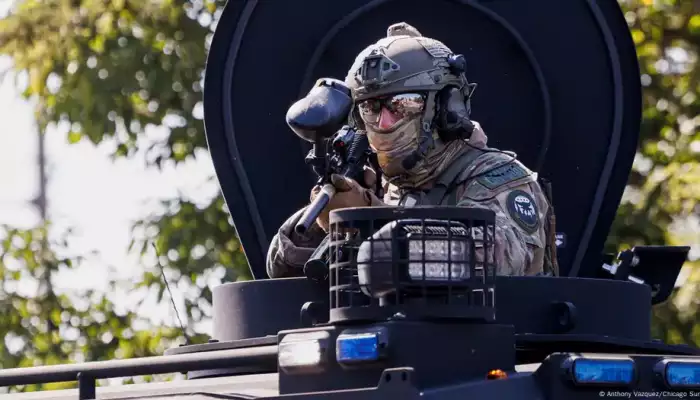
Chicago: US President Donald Trump has authorized the deployment of 300 National Guard troops to "protect federal officers and assets" in Chicago, the White House said late on Saturday.
Trump has been threatening to make the move for weeks as part of his militarised crackdown on immigration, which has triggered protests and accusations from critics that the president is using authoritarian tactics to seize power.
The decision was announced shortly after a judge temporarily suspended a similar deployment to Portland, Oregon.
Trump, a Republican, has already sent National Guard troops to Washington DC, Los Angeles and Memphis to clamp down on what he has called "rampant" crime, and has threatened to do the same for Chicago, New Orleans and Portland, among others.
The cities in question all have Democratic leaders, who all dispute Trump's claims that crime is out of control.
Why has the Trump administration deployed the troops to Chicago?
The announcement on Saturday comes after the Department of Homeland Security (DHS) said US Border Patrol personnel had shot an armed woman in Chicago, Illinois during a standoff between protesters and federal Immigration and Customs Enforcement (ICE) agents.
The incident saw a group, which included the armed woman, ramming cars into ICE vehicles, a DHS spokesperson said.
US Secretary of Homeland Security Kristi Noem said on X that she was "deploying more special operations to control the scene" and that "reinforcements were on their way."
No officers were seriously injured in the confrontation, while the woman took herself to hospital, a DHS statement said.
The protest at the immigration facility had started on Friday, with police making several arrests.
Chicago has seen several protests against increased immigration raids by federal agents over recent weeks.
Before the White House announced the troop deployment, the Governor of Illinois, JB Pritzker, had said Saturday morning that Trump had given him an "ultimatum" to deploy the Illinois National Guard.
"It is absolutely outrageous and un-American to demand a Governor send military troops within our own borders and against our will," Pritzker, a Democrat, said.
Judge temporarily blocks Portland troop deployment
The White House announced the Chicago National Guard deployment shortly after a judge had temporarily blocked the Trump administration from sending soldiers to Portland, Oregon.
Last week, Trump said he was authorising troops to use "full force if necessary" to tackle crime in what he called "war-ravaged Portland."
Trump said the soldiers were needed to protect federal Immigration and Customs Enforcement (ICE) facilities in Portland, which he said was "under siege and attack" from Antifa "domestic terrorists."
Why did Oregon officials sue the Trump administration?
Authorities in Portland have rejected Trump's allegations, with some saying some of the US president's claims on social media are based on images of violent protests in 2020 during unrest after the killing of George Floyd.
In the lawsuit, Oregon officials argued that the White House's deployment violated several federal laws as well as the state's right to police its own citizens.
They said Trump was trying to illegally take control of state National Guard units by exaggerating the threat of protests against his immigration policies. Oregon authorities said the protests in Portland were "small and sedate."
District Judge Karin Immergut agreed, and has ruled in favor of Oregon officials who had sued to block Trump's deployment.
In her ruling on Saturday, Immergut said protests in Portland do not present a "danger of rebellion" and that the city's "regular law enforcement forces" were able to deal with the incidents.
The troop deployment has been blocked until at least October 18. The White House said it would appeal.
“President Trump exercised his lawful authority to protect federal assets and personnel in Portland following violent riots and attacks on law enforcement — we expect to be vindicated by a higher court,” White House spokeswoman Abigail Jackson said.